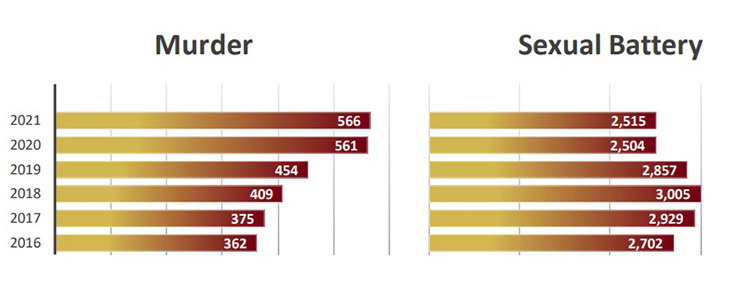South Carolina’s rates for sexual battery have dropped over the past few years, according to an annual study. (Graphic by S.C. State Law Enforcement Division)
Many South Carolina lawmakers are in support of a bill that would create a penalty for sexual extortion.
If passed, South Carolina would join nearly a dozen other states with sexual extortion, or “sextortion,” laws, according to the legal resources website HG.org.
Unlike other digital sexual crimes, laws against sexual extortion punish a person’s attempt to willfully and maliciously use a victim’s sexuality to cause them harm.
“It’s a very good bill that will help the people of South Carolina, help the children of South Carolina,” said Rep. Jeffrey Johnson, R-Horry.
The bill has been passed by the House Judiciary Committee and is headed for consideration by the full House.
There is no current “sextortion” law at the federal level. But previous statutes have been used to prosecute similar digital sexual crimes.
Utah and Arizona were the first states to pass similar laws in 2017.
The South Carolina bill includes an additional aggravated sexual extortion section, which mandates a sentence of up to 30 years in prison. Simple sexual extortion would carry a sentence of up to five years.
Local school districts as part of the bill would collaborate with the state Department of Education, the State Law Enforcement Division and the Attorney General’s Office to implement a policy to notify students and families of the provisions.
“We’ve got to protect our children,” Guffey said. “We all agree there’s nothing currently on the books to do so.”
The FBI recently reported an increase in financial sextortion cases involving minors.
The bill, originally promoted by primary sponsor Rep. Brandon Guffey, R-York, now has more than 50 sponsors. All 25 members of the House Judiciary Committee voted to move it out of committee on Tuesday.
Guffey lost a son to suicide after the young man faced sexual extortion, he told fellow lawmakers. He also shared his family’s story in a video he posted to Youtube five months ago.
“I feel like Gavin’s reputation is important, but it’s not more important than saving someone else’s life,” Guffey said. “There’s nothing that I’m not willing to do to stop this from happening to another family.”
According to SLED’s annual crime report, South Carolina’s sexual battery rate decreased by 1% from 2020 to 2021. It has decreased by more than 5% since 2012.



